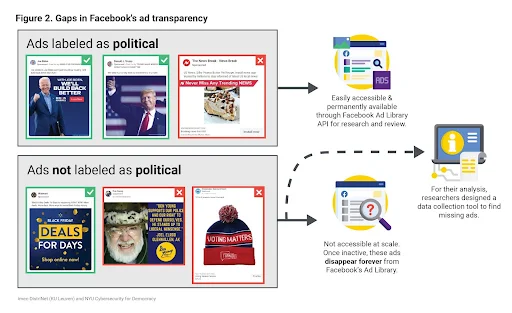Facebook has been working for years to improve its handling of political advertisements, but academics who examined millions of ads say the company's efforts have had mixed results. They claim that the issues include over counting political advertisements in the United States while under counting them in other nations.
According to the study conducted by teams at the NYU Cyber security for Democracy and the Belgian institution KU Leuven, despite Facebook's restriction on political advertisements around the time of last year's US elections, the network permitted more than 70,000 political ads to run nevertheless.
The researchers found that in Facebook's enforcement efforts on U.S. political ads, 61 percent more ads are missed than are detected worldwide, and 55 percent of U.S. detected ads are in fact non-political, after analyzing more than 4.2 million political and 29.6 million non-political ads from more than 215,000 advertisers. In terms of what constitutes a political ad, the researchers point out that Facebook's policy covers "advertising addressing social issues, elections, or politics." The system is then configured to enforce the rules based on that definition.
As the discourse around social and health concerns has become increasingly politicized, the scope of what might be perceived as a political statement has widened in recent years. The researchers attribute this trend to Facebook's proclivity in the United States to wrongly identify a non-political ad as a political ad.
This is not the top of the line in terms of content management or questionable material detection. There are a slew of more complex techniques that Facebook doesn't appear to be employing.
Humans are involved in certain aspects of Facebook's ad and content moderation system, although it is almost entirely automated. That method is riddled with inaccuracies. The other surprise was Facebook's apparent difficulty enforcing its prohibition on political advertisements in the United States. Many political marketers simply ceased airing commercials when the regulation was announced. However, not everyone followed the restriction.
Read next: Meta with the expansion of Horizon Worlds takes new steps into VR Social
According to the study conducted by teams at the NYU Cyber security for Democracy and the Belgian institution KU Leuven, despite Facebook's restriction on political advertisements around the time of last year's US elections, the network permitted more than 70,000 political ads to run nevertheless.
The researchers found that in Facebook's enforcement efforts on U.S. political ads, 61 percent more ads are missed than are detected worldwide, and 55 percent of U.S. detected ads are in fact non-political, after analyzing more than 4.2 million political and 29.6 million non-political ads from more than 215,000 advertisers. In terms of what constitutes a political ad, the researchers point out that Facebook's policy covers "advertising addressing social issues, elections, or politics." The system is then configured to enforce the rules based on that definition.
As the discourse around social and health concerns has become increasingly politicized, the scope of what might be perceived as a political statement has widened in recent years. The researchers attribute this trend to Facebook's proclivity in the United States to wrongly identify a non-political ad as a political ad.
This is not the top of the line in terms of content management or questionable material detection. There are a slew of more complex techniques that Facebook doesn't appear to be employing.
Humans are involved in certain aspects of Facebook's ad and content moderation system, although it is almost entirely automated. That method is riddled with inaccuracies. The other surprise was Facebook's apparent difficulty enforcing its prohibition on political advertisements in the United States. Many political marketers simply ceased airing commercials when the regulation was announced. However, not everyone followed the restriction.
Read next: Meta with the expansion of Horizon Worlds takes new steps into VR Social



